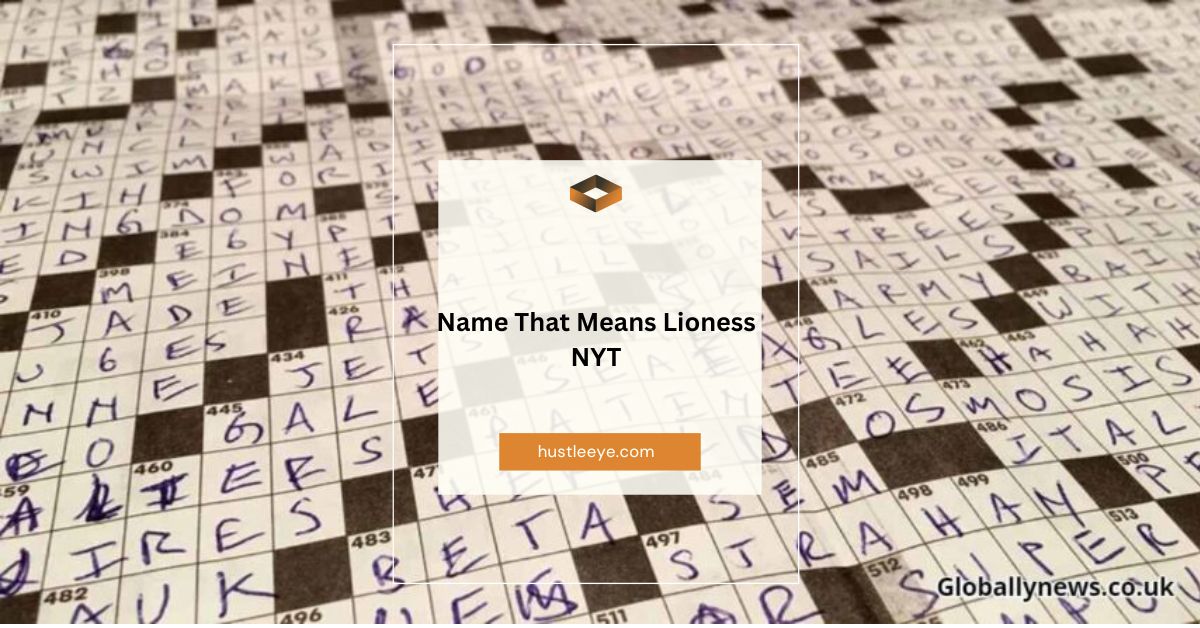Crossword puzzles have been a beloved pastime for generations, providing a unique blend of mental challenge, entertainment, and satisfaction upon completion. Among the many puzzles available, the New York Times (NYT) crossword is particularly famous for its complexity and the creativity of its clues. One such clue that often intrigues and sometimes stumps solvers is the “Name That Means Lioness NYT.” This article will explore the origins, significance, and strategies for solving this clue, with a focus on the name “Leona,” which is the answer to this puzzle.
Table of Contents
What is the “Name That Means Lioness NYT”?
1. The Puzzle Itself
The “Name That Means Lioness NYT” refers to a clue found in the NYT crossword puzzles. Crossword enthusiasts know that these puzzles require more than just general knowledge; they often demand an understanding of etymology, culture, and linguistic nuances. The answer to this specific clue is “Leona,” a name that directly translates to “lioness.”
2. Breaking Down the Clue:
To understand why “Leona” is the correct answer, it’s essential to break down the clue:
- “Name”: This indicates that the answer will be a proper noun, specifically a person’s name.
- “Means”: The clue is asking for a name that has a particular meaning.
- “Lioness”: The name in question should be related to a female lion.
Read More: Unlock Your Word Game Potential with WordFinderX: A Comprehensive Guide
Origins of the Name “Leona”:
1. Etymology and Meaning:
The name “Leona” has Latin roots, deriving from the word “leo,” which means “lion.” The suffix “-na” is often added to Latin-based names to create a feminine form, making “Leona” the female counterpart of “Leo.” Therefore, “Leona” directly translates to “lioness,” making it the perfect fit for the NYT crossword clue.
2. Historical Popularity:
“Leona” gained popularity in the English-speaking world during the late 19th and early 20th centuries. It was often chosen for its strong, regal connotations, reflecting the qualities associated with lions, such as strength, bravery, and leadership. Over time, the name became more widespread, finding favor in various cultures around the world.
3. Cultural Significance:
In addition to its literal meaning, the name “Leona” has been embraced by several notable figures in popular culture. For example, British singer Leona Lewis brought renewed attention to the name after winning the third series of “The X Factor” in 2006. Her success and talent further cemented the name’s association with strength and grace.
Read More: Pacers vs Milwaukee Bucks Stats: A Comprehensive Analysis
The Role of Language and Culture in Crossword Puzzles:
1. Understanding Language Roots:
To excel in crossword puzzles, especially those as challenging as the NYT crossword, solvers must develop a strong understanding of language roots. Many names and words used in crosswords are derived from Latin, Greek, or other ancient languages. Recognizing these roots can be a significant advantage in deciphering clues.
For instance, the Latin root “leo” is not only the basis for “Leona” but also appears in other words related to lions, such as “leonine” (resembling a lion) and “leopard” (a large feline related to the lion).
2. Cultural and Historical References:
Crossword puzzles often require solvers to think beyond the literal meaning of words. Clues may reference historical figures, literary works, or cultural phenomena. In the case of “Leona,” the name’s association with notable personalities and its metaphorical implications of strength and leadership add layers of meaning that go beyond its basic definition.
Read More: Cool Math Slice Master: The Ultimate Guide to Mastering the Game
Tips for Solving Similar Crossword Clues:
1. Analyze the Clue Structure:
Start by breaking down the clue into its components. Identify the type of answer required (e.g., a name, a phrase, a location) and the meaning or description provided. For the clue “Name That Means Lioness NYT,” knowing that the answer is a name and that it refers to a lioness is crucial.
2. Consider Language Roots and Etymology:
As mentioned earlier, many crossword clues are based on words with roots in ancient languages. Familiarizing yourself with these roots can provide valuable insights. For example, knowing that “leo” means “lion” in Latin can lead you to consider names like “Leona” for a clue related to a lioness.
3. Use Contextual Hints:
Crossword puzzles often provide additional hints through the number of letters required for the answer and the intersecting words from other clues. These contextual hints can help narrow down the possibilities. If you know the answer is a five-letter name, and you have some intersecting letters filled in, you can make an educated guess.
4. Expand Your Vocabulary:
The more you play crossword puzzles, the more you’ll encounter common clues and their answers. Regularly solving puzzles can help expand your vocabulary, making it easier to identify patterns and connections between words.
5. Utilize Crossword Solving Tools:
If you’re stuck on a particularly tricky clue, don’t hesitate to use online resources like crossword solvers or databases. These tools can suggest possible answers based on the letters you have and the length of the word.
6. Think Beyond the Literal:
Sometimes, crossword clues require a metaphorical or cultural interpretation rather than a direct translation. For example, a clue might use “lioness” not just to indicate a literal female lion, but to evoke qualities like strength or leadership that are culturally associated with lions.
7. Confirm Your Answer:
Before finalizing your answer, double-check it by filling in the intersecting words. If everything fits logically, you’ve likely found the correct solution.
Read More: King Javien Conde: The Untold Story Behind Erica Mena’s Son
Exploring the Popularity of “Leona” in Modern Culture:
1. Notable Figures Named Leona:
The name “Leona” has been chosen by several prominent individuals throughout history, further solidifying its cultural significance. One of the most famous modern bearers of the name is Leona Lewis, a British singer and songwriter who gained international fame after winning “The X Factor.” Her powerful voice and successful career have made her a household name, and in turn, brought renewed attention to the name “Leona.”
2. The Name in Literature and Media:
“Leona” has also appeared in various literary works and media, often as a character who embodies strength, independence, and leadership—qualities traditionally associated with lions. These portrayals have helped maintain the name’s popularity and its connotations of power and grace.
3. Why “Leona” Resonates:
The name “Leona” continues to resonate with parents looking for a name that conveys both strength and femininity. Its rich history, cultural significance, and association with notable figures make it an appealing choice for many.
Read More: Kjell Brutscheidt: An In-Depth Exploration of His Life, Career, and Unique Journey
FAQs About the “Name That Means Lioness NYT”:
1. What is the answer to the “Name That Means Lioness NYT” crossword clue?
The answer is “Leona,” which is derived from the Latin word “leo,” meaning lion, and the feminine suffix “-na.”
2. Why is “Leona” associated with a lioness?
“Leona” directly translates to “lioness” in Latin, as “leo” means lion and the suffix “-na” is added to create a feminine form.
3. Is the name “Leona” popular today?
Yes, “Leona” remains a popular name, particularly in English-speaking countries. Its association with strength, grace, and leadership qualities makes it a favored choice for many.
4. What are some other names that mean lioness?
Other names that are related to lions or lionesses include “Arielle” (Hebrew origin, meaning “lion of God”), “Lenora” (a variant of “Leona”), and “Nala” (popularized by the character in Disney’s “The Lion King,” though its origin is Swahili, meaning “successful”).
5. How can I improve my crossword puzzle-solving skills?
Improving your crossword-solving skills involves expanding your vocabulary, learning language roots, practicing regularly, and utilizing tools like crossword solvers or dictionaries when needed.
6. What makes the NYT crossword puzzles particularly challenging?
The NYT crossword puzzles are known for their clever wordplay, cultural references, and the need for solvers to think beyond the literal meanings of clues. This makes them both challenging and rewarding to complete.
Conclusion: Mastering the “Name That Means Lioness NYT” Clue
The “Name That Means Lioness NYT” crossword clue is a prime example of the complexity and cultural richness found in the New York Times puzzles. The answer, “Leona,” not only solves the puzzle but also offers a glimpse into the fascinating world of language and etymology. By understanding the origins of the name and the strategies for solving such clues, crossword enthusiasts can enhance their skills and enjoy the process of puzzle-solving even more.
With practice, a deeper understanding of language roots, and the tips provided in this article, you’ll be well on your way to mastering even the most challenging crossword puzzles, including those that feature clues like “Name That Means Lioness NYT.” Happy puzzling!


